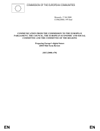 Brussels, 17.04.2008
Brussels, 17.04.2008COM(2008) 199 final
Information and Communication Technologies (ICTs) continue to be a major driver of economic and social modernisation. Today, businesses in the EU devote 20% of investment to ICTs, and the sector accounts for 26% of overall research expenditure. Moreover, 60% of basic public services are now fully available online and more than half of EU citizens use the Internet regularly.
The i2010 strategy, launched on 1 June 2005, was the first coherent policy framework for the era of convergent telecommunication and media services. Much progress has been made in the past three years. A few examples suffice to show the breadth of achievements: a new regulatory framework for audiovisual media services is in place; proposals to reform the regulation of electronic communications have been launched; regulation to create a single market for mobile phone use across borders is in operation; initiatives to boost online content in Europe are under discussion;4 major new R&D and innovation funding initiatives are up and running (the Seventh Research Framework and the ICT Policy Support Programme under the Competitiveness and Innovation Programme - CIP); ground-breaking public private partnerships (Joint Technology Initiatives) have just been launched; and new eInclusion initiatives are on track.
Meanwhile, Europe is among the world leaders in the development of the digital economy. The European broadband market, with 90 million lines, has more subscribers than any other economic region, and half of European citizens use the Internet on a regular basis. Some Member States top the world league in broadband take-up, mobile penetration, data traffic. But gaps between Member States are significant and Europe is under-investing when compared to other industrialised regions, as well as facing growing competition from China and India. That is why the policy framework provided by i2010 is needed more than ever today. But does the i2010 framework need adjusting mid-way through its term?
Download Preparing Europe's Digital Future i2010 Mid-Term Review (.pdf, 216 KB).
Download from the eHealthNews.EU Portal's mirror: Preparing Europe's Digital Future i2010 Mid-Term Review (.pdf, 216 KB).
Related news article:
For further information, please visit:
http://ec.europa.eu/i2010
About i2010 Strategy
The i2010 strategy is the EU policy framework for the information society and media. It promotes the positive contribution that information and communication technologies (ICT) can make to the economy, society and personal quality of life. The European Commission presented it in June 2005 as the new initiative for the years up to 2010.
The i2010 strategy has three aims:
- to create a Single European Information Space, which promotes an open and competitive internal market for information society and media services,
- to strengthen investment and innovation in ICT research,
- to support inclusion, better public services and quality of life through the use of ICT.
To achieve those aims there are various actions such as regulation, funding for research and pilot projects, promotion activities and partnerships with stakeholders.
The strategy and actions, presented in the i2010 Communication of 2005, are reviewed and updated through i2010 Annual Reports. The annual report also analyses developments in the ICT sector and assesses the Member States' progress in implementing their ICT objectives.
For further information, please visit:
http://ec.europa.eu/i2010